On September 14, after Senior Lieutenant General Nguyen Chi Vinh passed away at his home, we had a conversation with Mr. Le Kien Thanh to listen to his sharing about his close friend who "still had so many things to say to life and people".
During the conversation, Mr. Thanh was often moved and silent for a long time, as if he was drifting into very private memories of his friend who had just passed away at midnight.
When talking about Senior Lieutenant General Nguyen Chi Vinh , what do you remember most?
- I didn't know Chi Vinh when I was young. It was only later, when Vinh became a military officer, that I met him and became close to him.
Although our two families lived close to each other and our fathers were close, because of the 4-year age difference (Chi Vinh was younger), we did not have the opportunity to play together as children. Children have to be the same age to be close.
We met by chance and talked to each other when Chi Vinh was a high-ranking military officer and I was a businessman. Through our meetings and conversations, we understood each other deeply.
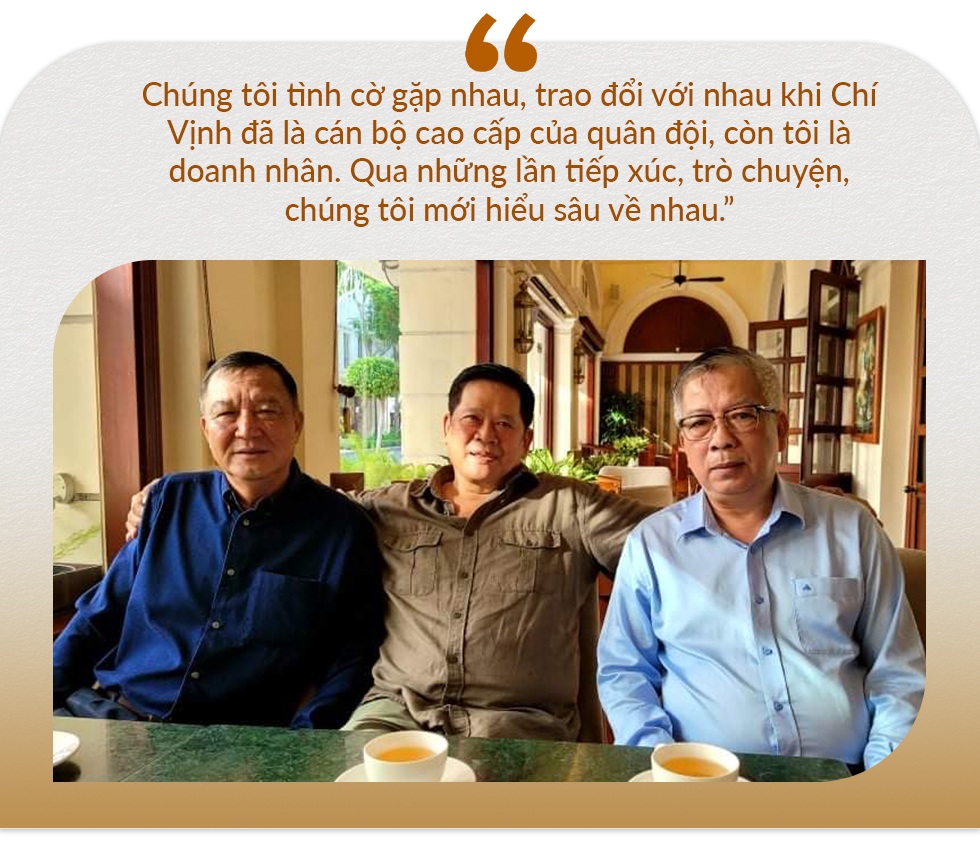
If talking about Chi Vinh, just a few words cannot fully describe who he is.
Here, I only talk about Chi Vinh from the perspective of a person. However, it is necessary to mention many aspects and characteristics. Nguyen Chi Vinh is very intelligent, determined, a resourceful person, an emotional person and a kind person.
When you first became close friends, what was the most memorable story about Senior Lieutenant General Nguyen Chi Vinh ?
- During one meeting, Chi Vinh told me about a memorable memory. After hearing that story, I was very impressed.
In the midst of a fierce war, Chi Vinh traveled by road - at that time a very dangerous route because of falling bombs and exploding bullets - to the command bunker of a leader who once held a very high position in this territory.
What did Chi Vinh go there for? He said his purpose was to research how a modern war would be fought, what weapons would be used, how the war would be waged…
This was the time when Chi Vinh had returned from the Cambodian battlefield and was living a peaceful life, but he was still willing to go to the place where bombs were falling and bullets were exploding to learn and research in practice, in order to draw some lessons, and then continue to serve the Fatherland.
Chi Vinh said that while in the bunker, the leader asked: "I heard you smoke a lot, but why don't I see you smoking here?". Chi Vinh replied: "To ensure your health, I will never smoke in front of you." The leader then took out a cigarette and offered it to Chi Vinh, who also smoked, then said: "You just smoke. If you like this cigarette, I will send you two packs of cigarettes every month. Even if I am no longer here, you will still receive these two packs of cigarettes."
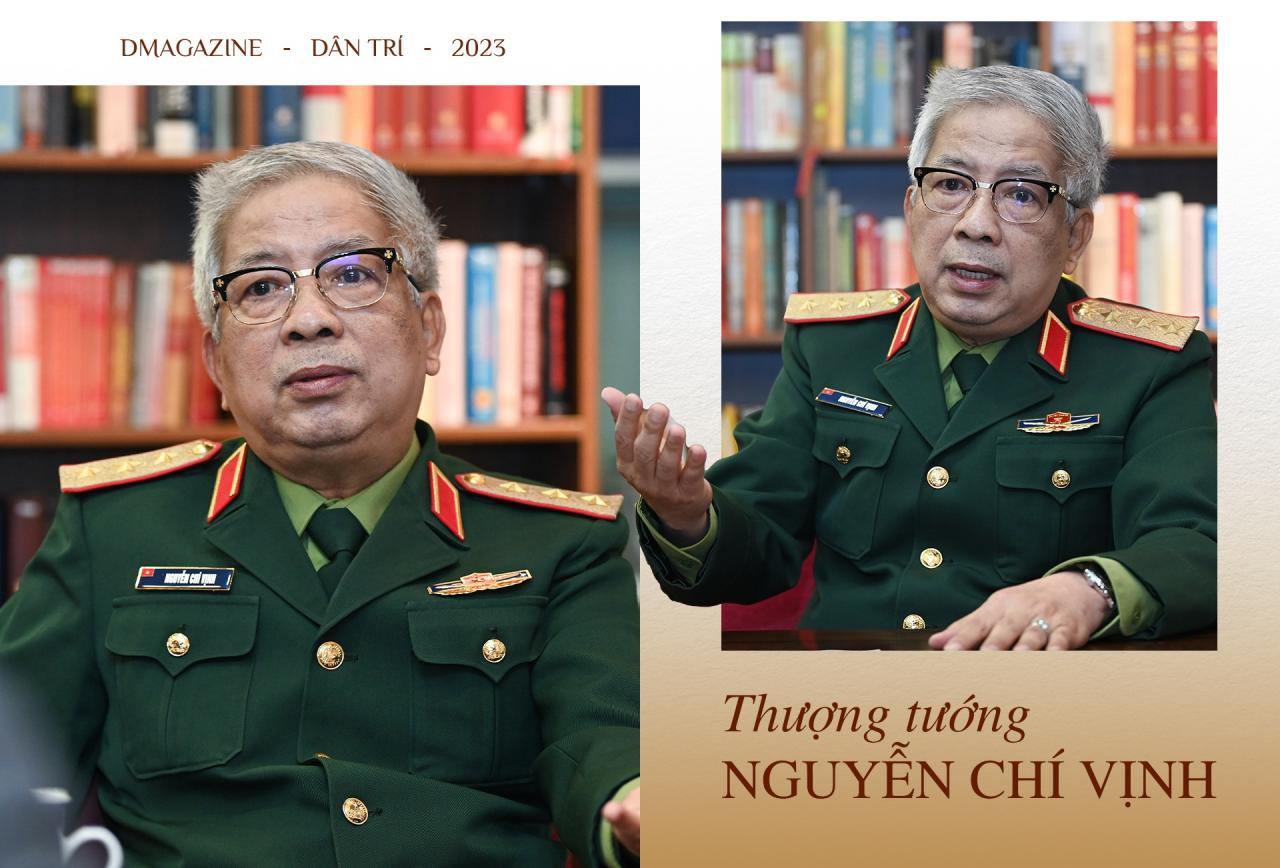
And indeed, later when the war ended, even when the above leader was imprisoned when the situation changed, for a long time, Chi Vinh still received the 2 cartons of cigarettes that he had promised.
Do you see a part of Nguyen Chi Vinh's personality in that story?
A person who is brave in work, tactful in behavior and very respectful of others ?
- That's right!
As you mentioned, due to the age gap, the two had little contact when they were young and only became close when they were adults. So how did the friendship between a businessman and a general form ?
- Whenever we meet, the thing we talk about and share the most is about our fathers. And we are lucky to have fathers who share the same aspirations, the same ideals, and who stood side by side during our revolutionary activities, so we have a lot of empathy between us.
Chi Vinh told me that his father considered my father as a mentor during his revolutionary activities in Hue .
In the following years, General Nguyen Chi Thanh worked in the Central region, while my father worked in the South. Their wills blended and united, with the same goal of liberating the beloved South and unifying the country. At that time, this was an issue with different opinions, but when the key people understood each other and reached a consensus, they decided to liberate the South by revolutionary violence. Our two fathers met at that point.
So , the friendship between you and Senior Lieutenant General Nguyen Chi Vinh was based on the friendship of fathers?
- That's right! I think that the sympathy between two people is coincidental, is natural. Family circumstances can also be a reason. Sympathy in ideals is also a reason. Similarity in personality is also a reason.
When people are close to each other, there are many conditions. They may have the same ideals, but if their personalities are different, it is difficult to get along. Having one element in common does not mean everything is in common.
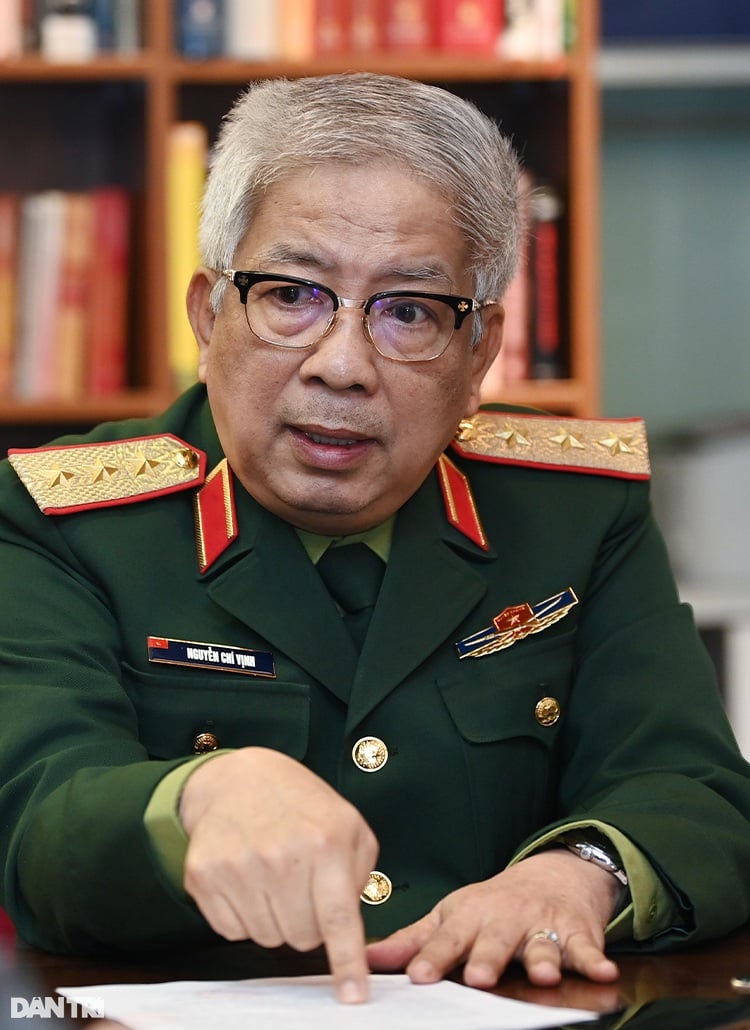
Vinh and I happen to have many things in common, there are things we can share, we can tell each other everything without fear of making the other angry or offended.
Besides sympathy, did you and Senior Lieutenant General Nguyen Chi Vinh ever argue about anything?
- There are debates, but not none. When looking at an issue, some people emphasize one point, others emphasize another. But in the end, perhaps we have more in common.
Which specific debate do you still remember in detail?
- I remember once sharing with Chi Vinh about my father's thoughts, that in his life of revolutionary activities, he never feared anyone taller than him, nor did he see anyone shorter than him.
When he went out to meet the heads of great powers, he was also normal, ready to debate and did not accept imposition. But on the contrary, with the people around him, from the servants to the children, he never looked down on them, giving them the look of someone of lower status.
There is a story told, after the country's reunification, my father went to a school in An Giang . Here, he met and talked with the students. What surprised others at that time (including the provincial leaders and teachers of the school) was that my father raised his voice and spoke very harshly to a boy. He explained to that boy: "I'm harsh with you because I consider you my comrade. We are two comrades debating the same issue." He did not consider him just a child and then pat his head and say "you don't understand anything yet", he did not do that, it was an attitude of contempt! Here the debate shows an equal view.
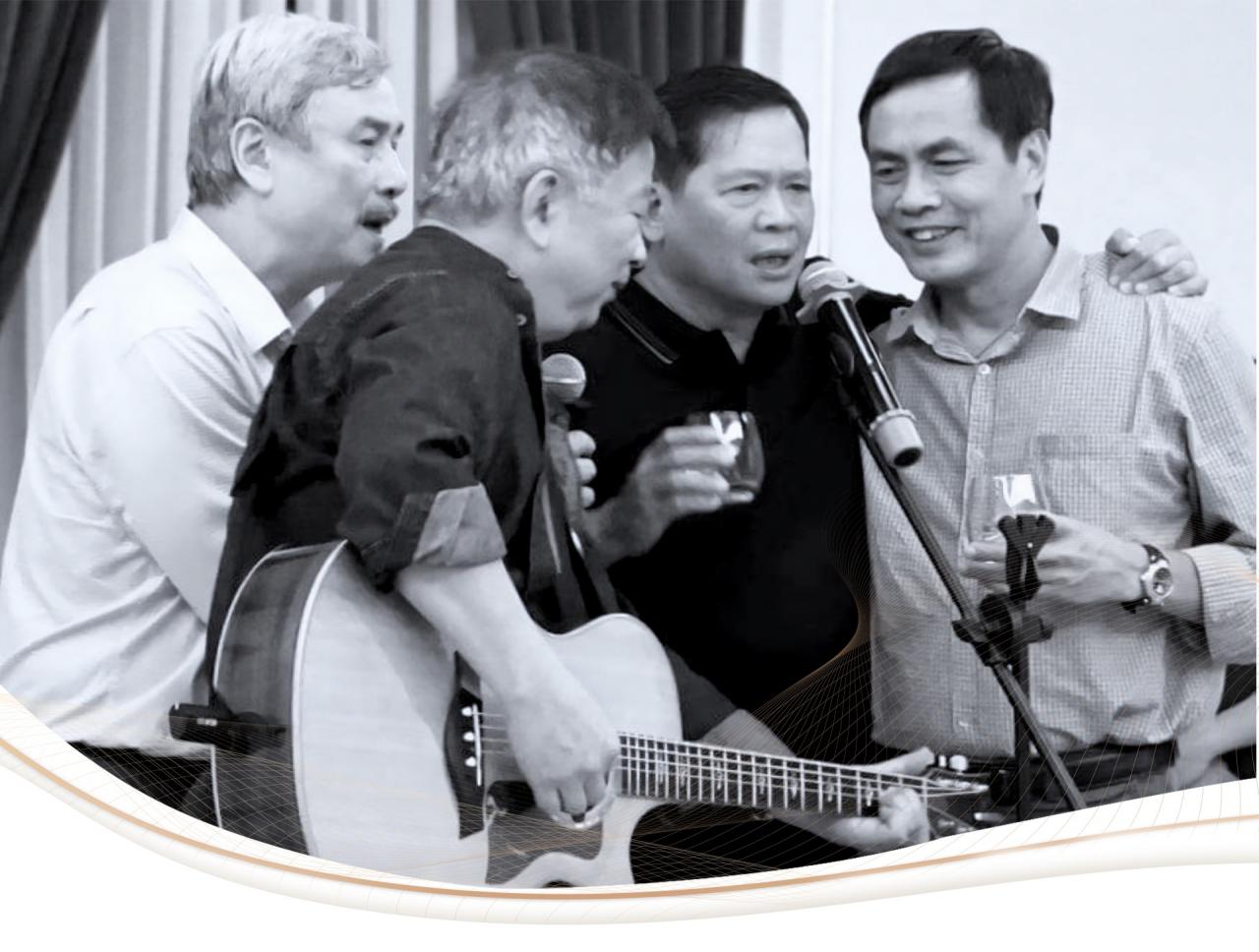
One time, I heard my father tell my mother that when he was young, his grandfather took him to school with his siblings. His grandfather told him: "Try to study so that you won't have to carry water for others in the future." At that time, my father replied: "You (the way people from the Central region call their fathers) say that's strange. What are you studying for? If you don't have to carry water, then what's the point of studying?" Even when he was young, my father was like that, always ready to argue with his father, not just bowing his head and listening.
When I told this story to Chi Vinh and repeated my father's point of view, Vinh seemed to disagree. He said: "So, doesn't Uncle Le Duan think his father is superior?"
I thought, perhaps Chi Vinh misunderstood my father's story. High - low here is not about rank, age, not disrespect. Then I wondered, "Why do I find that story interesting but Chi Vinh doesn't?"
Have you and your close friend Nguyen Chi Vinh ever talked about the advantages and disadvantages in life and career, from the perspective of family tradition?
- Actually, there are many children of leaders in my father's generation or Chi Vinh's father's generation, but not many are successful. Chi Vinh is successful, but I am not.
Not all situations are the same. Not only me, but I can point out many other people who are children of leaders who held important positions in the country but did not achieve the same success as Nguyen Chi Vinh.
Many people of my father's generation of leaders have children who do only ordinary jobs.
Maybe the circumstances and starting point are the same but the level of success of each person is not the same! But we often do not talk about this issue.
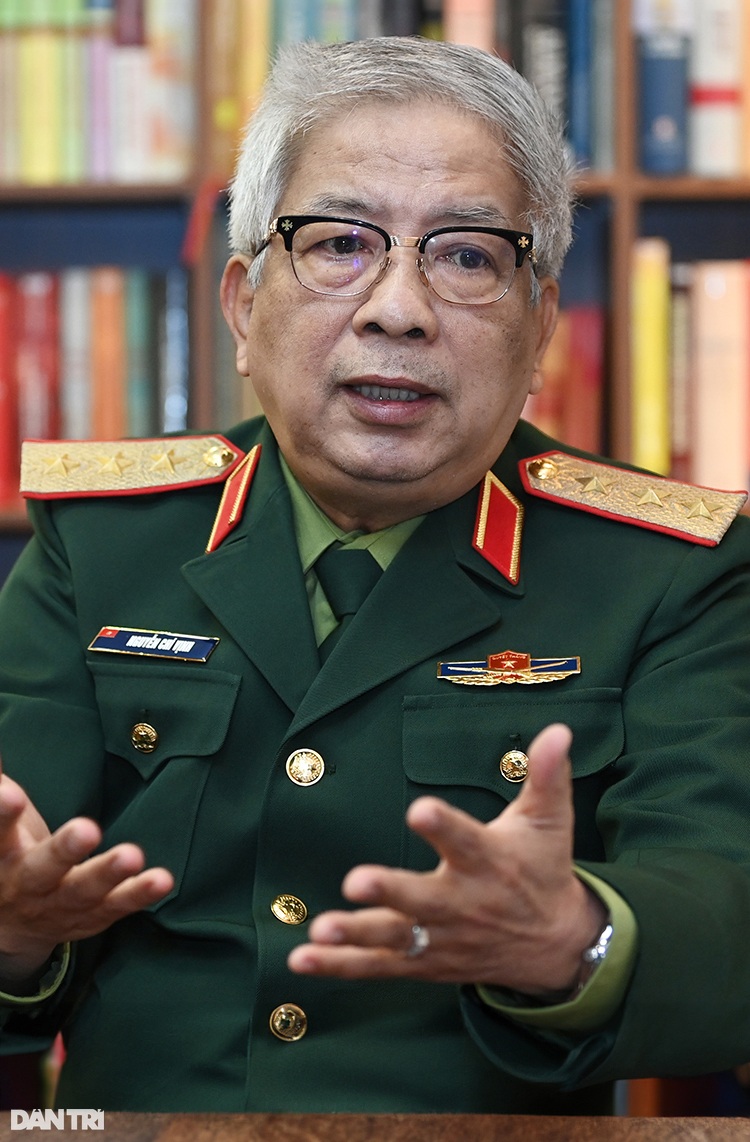
In a previous interview with Senior Lieutenant General Nguyen Chi Vinh, we heard him share about the advantages and pressures of being "the son of Senior Lieutenant General Nguyen Chi Thanh". What about you?
- When I was in school, because I was my father's son, I was under a lot of pressure. I had no right to be a bad student. I had more opportunities to study while many of my peers in the countryside had to herd buffalo, cut grass, and work to help their families; in the city, they had to cook, look after younger siblings, go to the market for their parents... so how could I not study well?
The pressure is intense!
Of course, to be really good requires intelligence, but to be able to learn the lessons and not get bad grades, all you need is diligence. If I wasn't number one in the class, I was number 2, number 3, or number 4.
Even when people don't know who you are or what your family is like, you still have to try hard and make an effort to do everything, be it carrying soil or digging soil, you have to do it well. How can we make sure that later, if people know who you are, they won't laugh at you: "You're his son, but you don't even know how to hold a hoe or carry a burden." That's a real pressure!
Later on when I started working, I never put pressure on myself to become an official or to hold a big responsibility. The biggest pressure I put on myself was not to do anything that would affect my family's reputation.
I think Chi Vinh is the same as me. We will try our best to serve to the best of our ability, and never put pressure on ourselves like, as the leader's child, I have to do this or that position to be worthy - never have that thought!
Senior Lieutenant General Nguyen Chi Vinh is known as a military man with strategic vision, with many outstanding contributions in the fields of intelligence and defense diplomacy, and especially very open and willing to dialogue with the press. In your opinion, what are the foundations that have formed these qualities in Senior Lieutenant General Nguyen Chi Vinh?
- I think that foundation began and lasted since Chi Vinh went deep into the military career on the Cambodian battlefield.
Those were tough years. Our difficulties in Cambodia were different from those in the struggle to liberate the South. In the struggle to liberate the South, we fought on our own soil. In Cambodia, although we were in the mood to help our friends, we were still fighting on someone else’s soil.
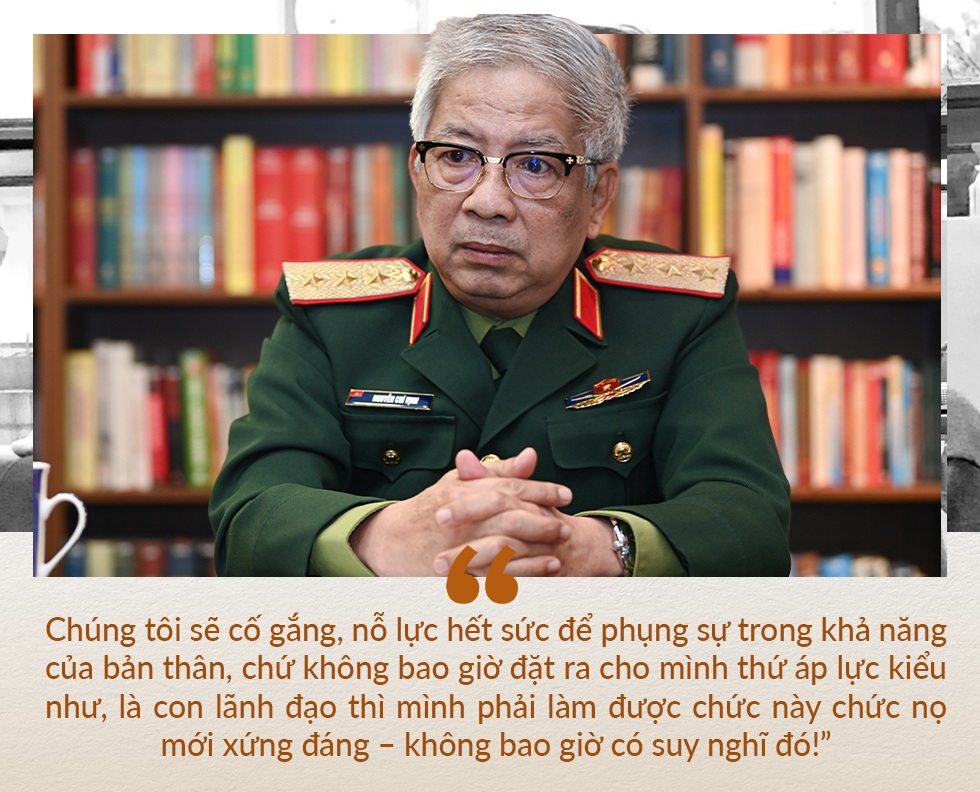
When we fight on our land, we have almost the whole world's support; but when we help our friends on their land, even though it is to serve a just cause, we encounter many obstacles, face misunderstandings, and still have to complete that just mission. Helping our friends is also saving ourselves.
It is difficult to imagine all the hardships of that time, especially for a young officer. From the battlefield to life, Chi Vinh also experienced challenges, even paradoxes. But it was from the circumstances that gradually permeated Chi Vinh, tempered and forged his character.
In my opinion, the qualities of a soldier, a commander, an intelligence officer… in Chi Vinh began to take shape during those particularly difficult years on the Cambodian battlefield. It was many years later that the world understood us.
Besides traditional family and life stories, did Senior Lieutenant General Nguyen Chi Vinh share with you about his work?
- Chi Vinh does a relatively special job (intelligence general), so even when he encounters difficulties and hardships, he has no right to share them with me.
Of course, there were also certain situations that he himself experienced, which he told me about.
For example, when Chi Vinh received the rank of General, became the Director General of General Department II (Ministry of National Defense), and had just moved from the South to the North, there was some advice for him that wearing military uniform, bringing his wife and children to greet this person and that person would be better for his future career path.
Chi Vinh told me: "If there was no such advice, then as a junior, I would also go to greet my seniors, introduce myself to this person and that person... But the suggestion to help me understand it from another perspective, with another purpose that is no longer pure, then I definitely would not do that. If it is innocent, it is different, but if it is to achieve some purpose, I will not do it!"
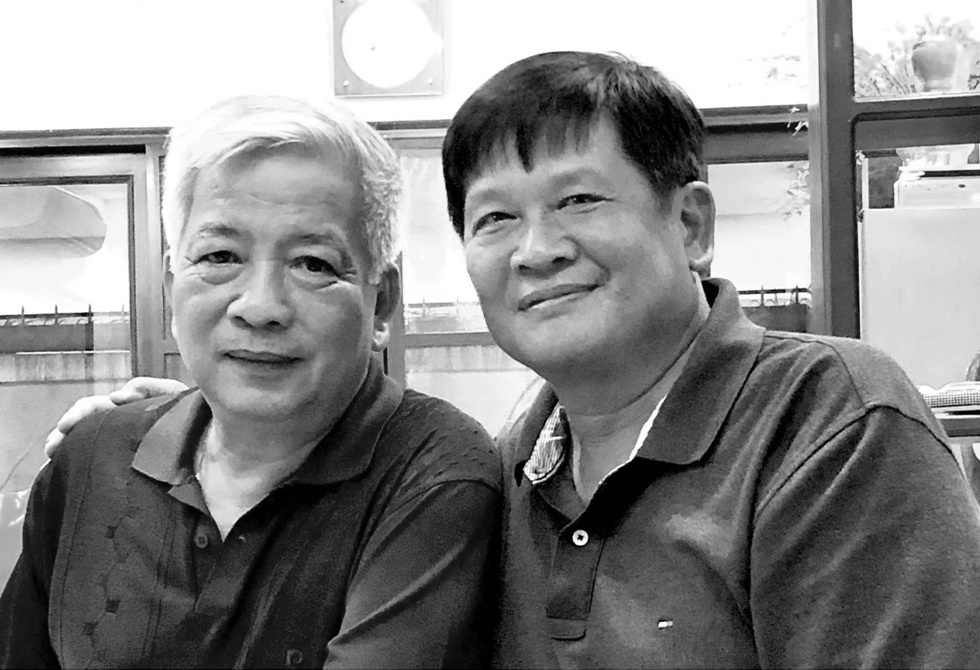
Chi Vinh is such a straightforward person! That is just a small story that Chi Vinh opened up to share with me, enough for me to understand more about him: Upright, straightforward, not begging anyone for fame. I believe he has many more stories to go through.
Chi Vinh considered me as a brother, a close friend, but I was not a comrade who had fought on the Cambodian battlefield or on the silent fronts with him. A comrade was someone who had gone through many events with him, fought together in dangerous situations; as for a brother like me, he could only love and cherish me.
We are close friends, but I am an outsider after all, he can't talk about internal stories.
As you shared, Senior Lieutenant General Nguyen Chi Vinh still has "many unfinished plans, many things he wants to say to life and people". What are the plans of Senior Lieutenant General Nguyen Chi Vinh that you know?
- Many! Chi Vinh still has many plans and regrets before leaving this life...
One of the things that I know that Chi Vinh is very worried about and tormented about is that the process of fighting to bring the remains of 64 soldiers at Gac Ma home has not been achieved yet. "For us, the duty of the dead is the duty of the dead", Chi Vinh once said.
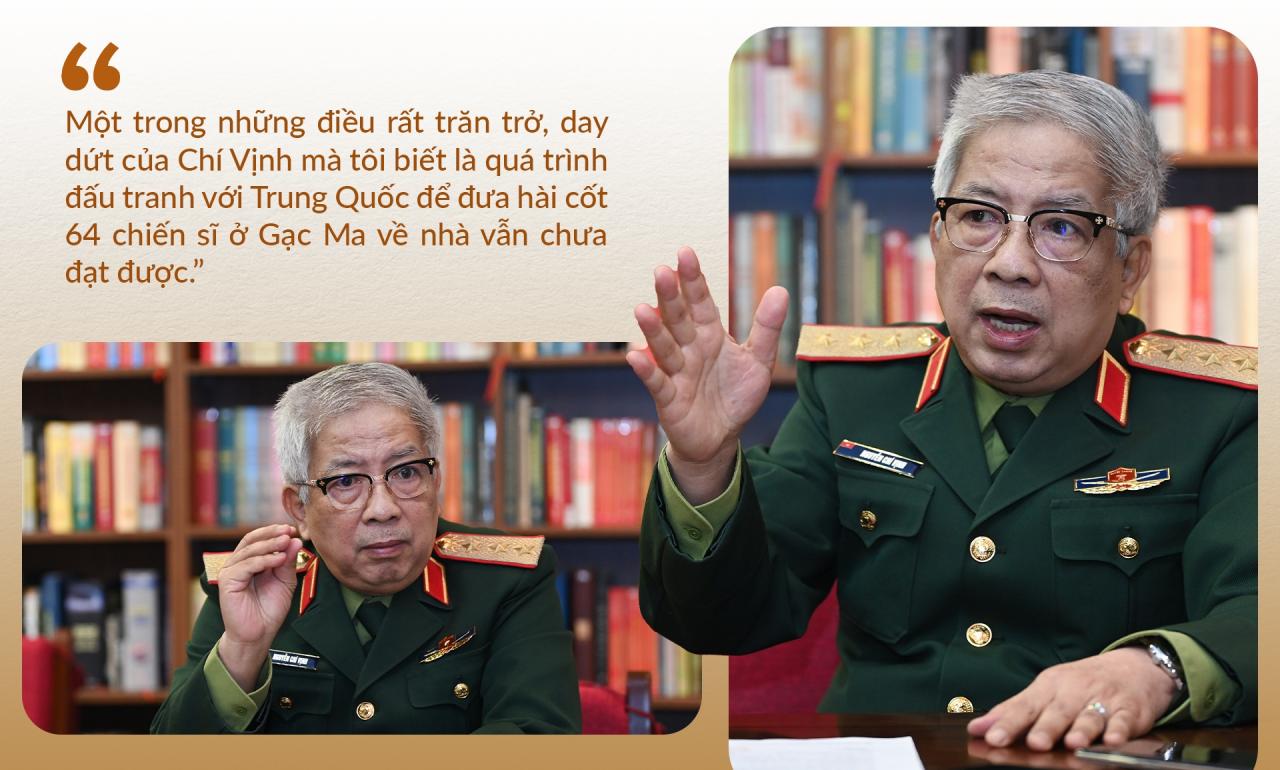
With his work and position, Chi Vinh has a lot of data and information. For example, why did the socialist model in the Soviet Union and Eastern Europe collapse? What are the stories and what lessons can we learn from them? On the path we are on, what should we avoid?
Recently, if we watched the movie "Winter 1991", we will see a very small part of what Chi Vinh and the team that made this movie did.
Right from the time we first heard about Vinh's illness, there was already some incorrect information about Chi Vinh on the internet that he had not yet addressed. Chi Vinh decided to slowly reveal the truth, including many documents, evidence, and full arguments, not just what he had "heard" on the internet.
Chi Vinh has access to a lot of documents and data both internally and from subjects and partners. I think, if there is time, Chi Vinh will gradually announce the information (that can be made public) that he has to clarify many things, but… it is too late.
The last time Tran Huu Binh (aka Binh Ca - author of the book "Nam Dong Military Zone") and I met Chi Vinh was in Hospital 108. Before we left, Vinh shook hands with Binh Ca and said: "Now there are 2 books left, please help me!".
The book "The Teacher - written about Major General Dang Tran Duc, Hero of the Armed Forces" recently published is only a very small part of what Chi Vinh wants to tell.
Chi Vinh’s career path is so rich, there are so many stories. Unfortunately, life does not please people. Chi Vinh still cherished many things. I hope that his comrades will continue to do and continue his ambition.
After all, how will he remember his close friend?
- It is difficult to talk about a person, to give a complete comment. I am Chi Vinh's brother and close friend, but I did not go through the problems at work with him. Therefore, I should not be the one to give a conclusion. At least it should be his comrades who have shared the same hardships with Chi Vinh, and gone through the challenges at work with Chi Vinh. Only they have the right to comment on him.
What I know about Chi Vinh is as a human being, not as a general. As a human being, there are things that are good for one person but not good for another.
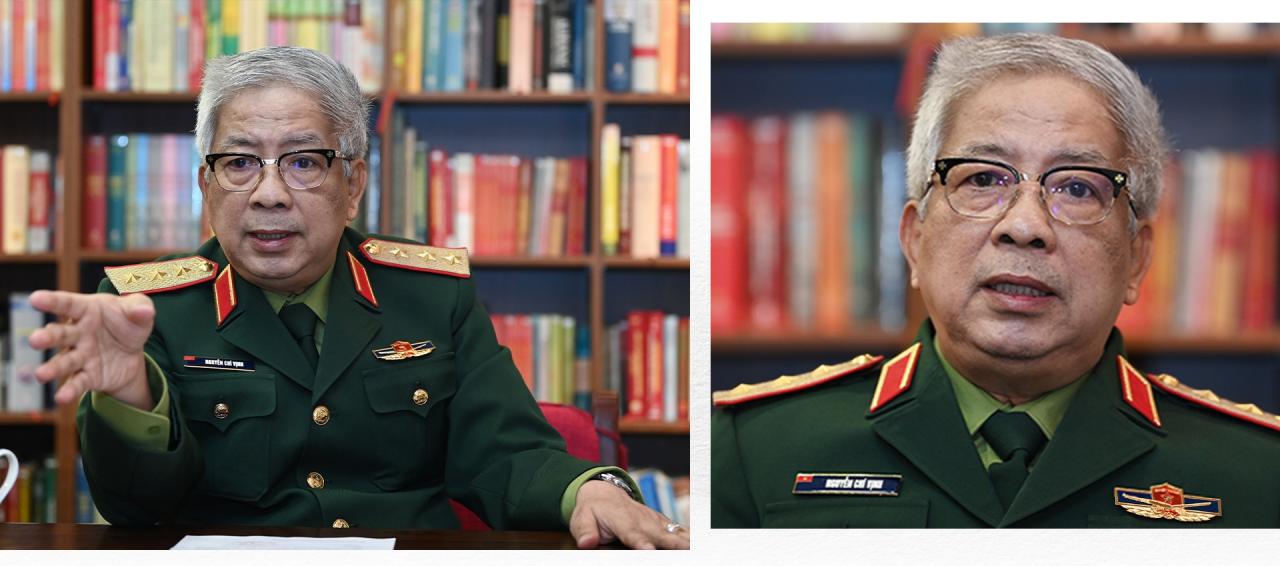
Regarding Nguyen Chi Vinh, I would like to leave it to his comrades, teammates, and possibly his superiors and subordinates to evaluate.
Today, I share my stories, my thoughts about Chi Vinh so that others can see another side, another angle of him, that: "Nguyen Chi Vinh in Le Kien Thanh's eyes is like that!".
X in thanks for this chat!
Dantri.com.vn


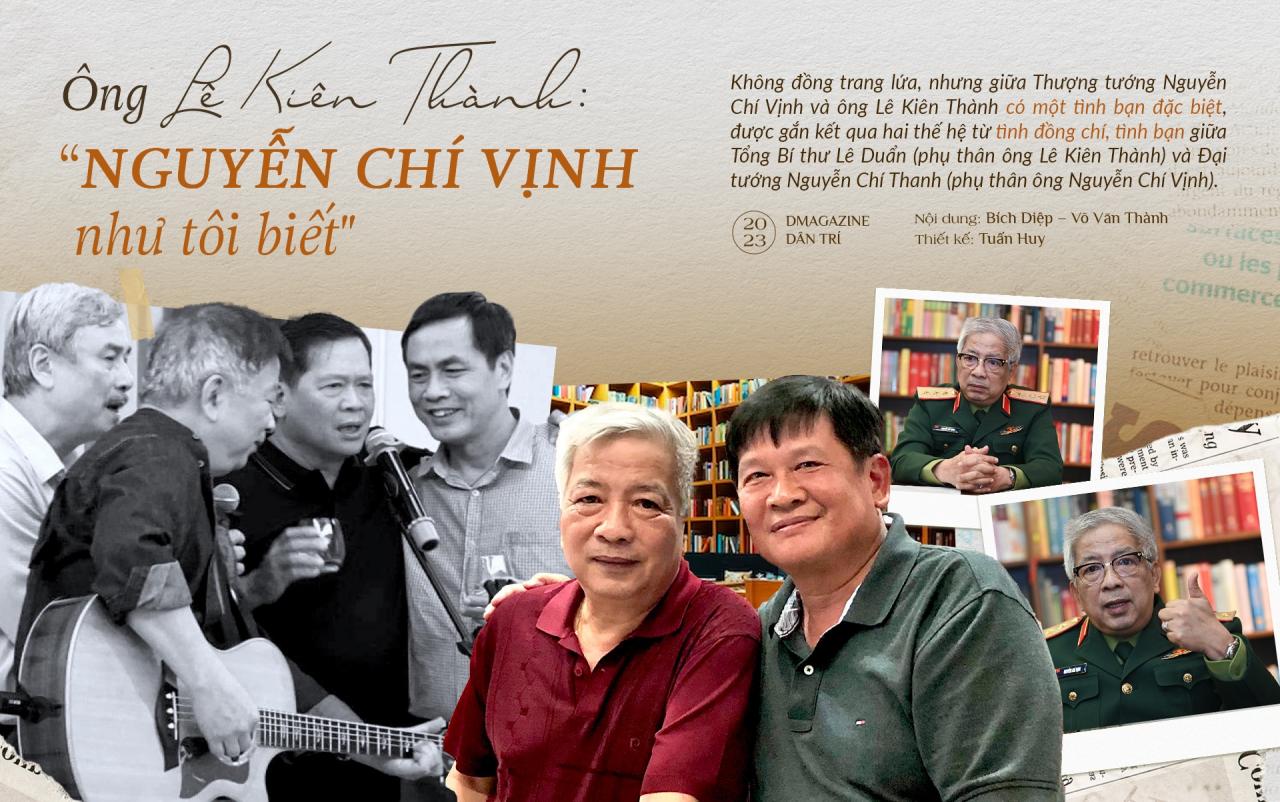


![[Photo] National Assembly Chairman Tran Thanh Man chairs the 8th Conference of full-time National Assembly deputies](https://vphoto.vietnam.vn/thumb/1200x675/vietnam/resource/IMAGE/2025/9/29/2c21459bc38d44ffaacd679ab9a0477c)
![[Photo] Many streets in Hanoi were flooded due to the effects of storm Bualoi](https://vphoto.vietnam.vn/thumb/1200x675/vietnam/resource/IMAGE/2025/9/29/18b658aa0fa2495c927ade4bbe0096df)
![[Photo] General Secretary To Lam attends the ceremony to celebrate the 80th anniversary of the post and telecommunications sector and the 66th anniversary of the science and technology sector.](https://vphoto.vietnam.vn/thumb/1200x675/vietnam/resource/IMAGE/2025/9/29/8e86b39b8fe44121a2b14a031f4cef46)
![[Photo] General Secretary To Lam receives US Ambassador to Vietnam Marc Knapper](https://vphoto.vietnam.vn/thumb/1200x675/vietnam/resource/IMAGE/2025/9/29/c8fd0761aa184da7814aee57d87c49b3)
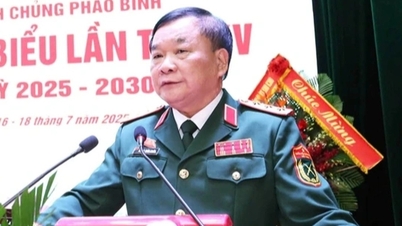
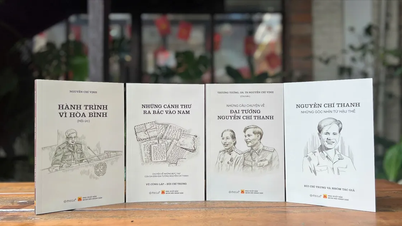



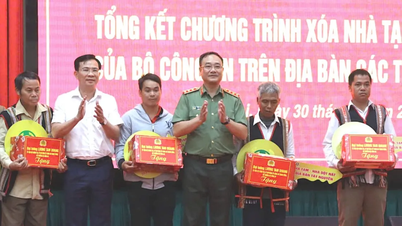
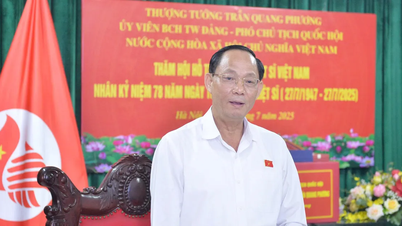
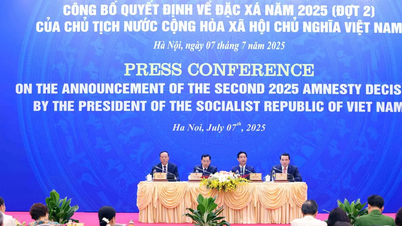




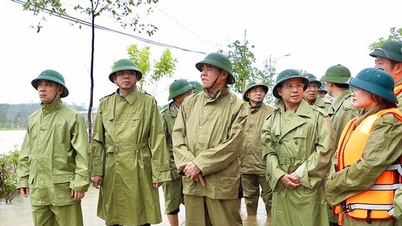
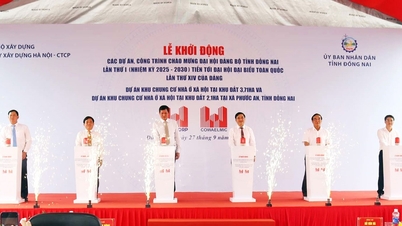
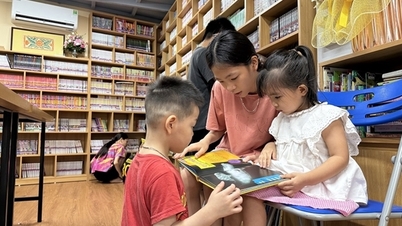








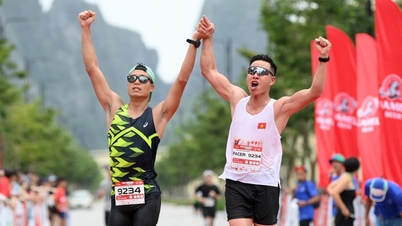
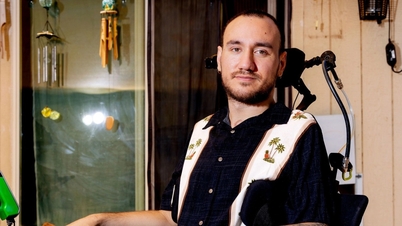


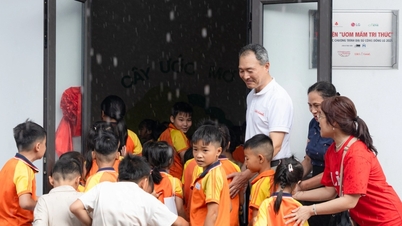
































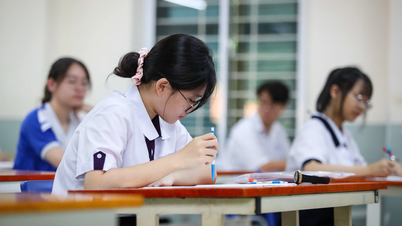
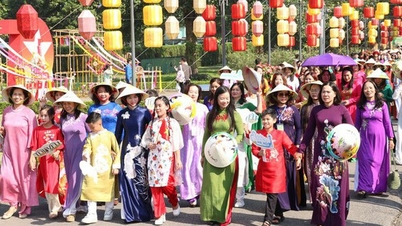

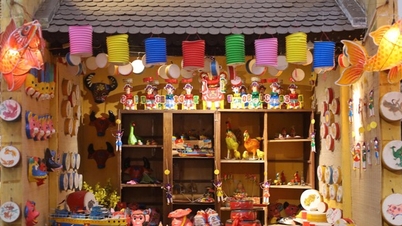










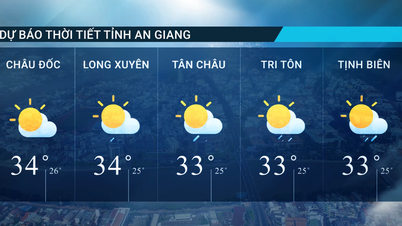



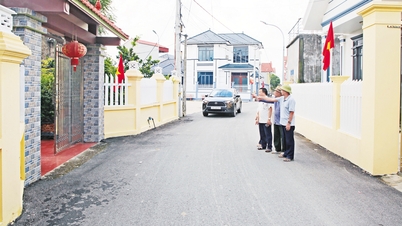

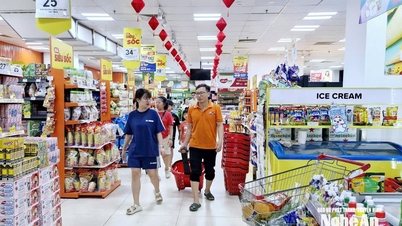














Comment (0)